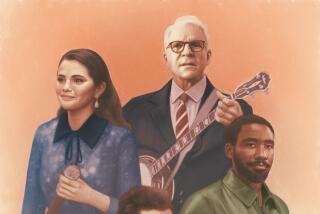Review: Donald Glover’s new FX series, ‘Atlanta,’ is a beautifully played comedy of place and character
Donald Glover, who broke up one of television’s great comedy teams – his Troy to Danny Pudi’s Abed – when he left “Community” in its penultimate season, is back with a series of his own. As naturalistic as “Community” was fantastic, “Atlanta,” premiering Tuesday on FX, is subtle and human, a beautifully played comedy of place and character.
Like its fellow FX series “Louie” and “Baskets” — with whom it shares Christian Sprenger, a talented director of photography — and Pamela Adlon’s upcoming “Better Things,” “Atlanta” sets a tone that is a little melancholic but not pessimistic; it’s aspirational in a minor key. It is critical in an interested, even amazed, way about people, while managing not to judge them.
Glover plays Earn, a young man back home in Atlanta after an unspecified time away, living “low-key” with no clear plans. A sophisticated, intelligent and in many respects helpless sort of person going about with a backpack that might contain all his worldly goods, he is “technically homeless,” though more or less living with Van (Zazie Beetz), the mother of their baby daughter. The ground beneath their inchoate relationship shifts from scene to scene.
“I think we just need a chance as humans to fail, to discover what actually works,” Earn tells Van by way of explaining, if not excusing himself. “People don’t think there’s a process to being happy.” To a (possibly imagined) stranger on a bus he will wonder, “Are some people supposed to lose, for balance in the universe?”
Things start to change when he discovers that Paper Boi, a local rapper, having some street-level success, is his cousin Alfred (Brian Tyree Henry); he looks him up to offer himself as a manger.
Alfred and his right hand, Darius (Lakeith Stanfield), are, in their way, the Troy and Abed of “Atlanta.” Physically, as well as temperamentally, they’re its Laurel and Hardy: Alfred, big and practical (“I scare people at ATMs, boy, I have to rap – that’s what rap is, making the best out of a bad situation”); Darius, thin and mystical, hapless but in his fashion capable. Darius is a character whose TV ancestors run back to Maynard G. Krebs, but whom Stanfield makes specific and new. (“Can I measure your tree?” he asks Earn’s father.) The pair deal drugs in a small but profitable way. “It’s easy,” says Darius. “People are addicted to ‘em.”
Although they’re at the center of the action, Earn and Albert and Darius also remain unexplained. Glover and his writers (including brother Stephen Glover) have a distaste for exposition or for providing context or motivation more aggressively than life does. Backstory is revealed only fleetingly; there is an undeveloped reference to “Princeton” as a place Earn had been, but if you look away for a second you can miss even that.
Most of the season’s 10 episodes have been directed by Hiro Murai, previously a director of music videos (including Glover’s, under his nom de hip-hop, Childish Gambino) and commercials; he has a gift for getting to the essence of things without weighing them down with stylishness. Atlanta, with its red-brick buildings and tall trees, its back stairs and landings, is vividly present; you feel the heat and humidity.
People live in the sorts of spaces real people live in, apartment-sized apartments, single-family homes with normal-sized rooms, appropriately furnished to budget and character. (Alfred’s place is roomy but relatively empty.) Earn spends most of the second episode in a police station in a flatly lighted purgatorial holding room; bits of conversation and activity float around him, not to advance a plot but to enlarge the palette; it has the flavor of a travelogue, in a room.
This is in some respects a show about music – Earn introducing himself into Alfred’s career is what gets the story started, and the (so far small) changes brought about by Paper Boi’s rising profile is what moves it along. But, apart from a glimpse of homemade video and Alfred’s breaking out a few lines to prove he’s Paper Boi, in the first four episodes we never see music being written or recorded or performed.
This isn’t “The Get Down” or “Empire.” Music is part of the fabric but not the point of the story, and though greater success may await our heroes down the road, in a way I hope it doesn’t. Success stories are a dime a dozen on TV; life is less cooperative.
‘Atlanta’
Where: FX
When: 10 p.m. Tuesday
Rating: TV-MA (may be unsuitable for children under the age of 17)
More to Read
The complete guide to home viewing
Get Screen Gab for everything about the TV shows and streaming movies everyone’s talking about.
You may occasionally receive promotional content from the Los Angeles Times.







